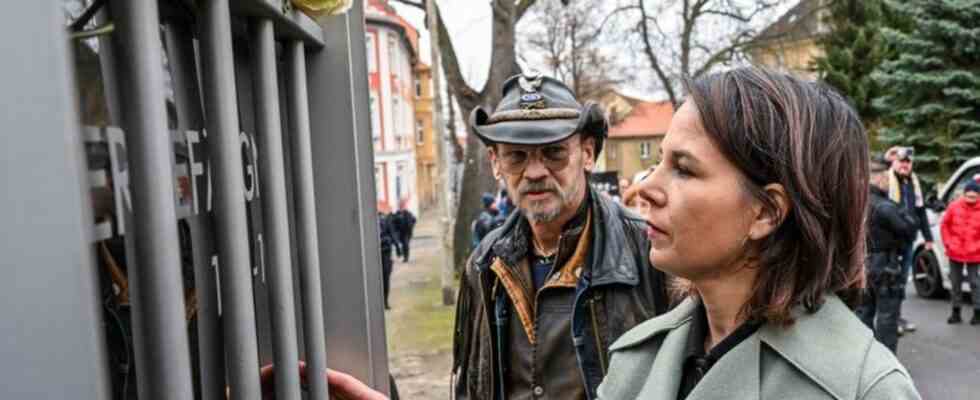Story
Baerbock wants more help for SED victims
Annalena Baerbock at the memorial of the so-called children’s prison from GDR times. photo
© Jens Kalaene/dpa
Annalena Baerbock is not only Foreign Minister, she also represents the Brandenburg Greens in the Bundestag. Away from foreign policy, she takes time for former SED victims. But even here she catches up with her office.
At the back, at the very end of the corridor, there was her cell. Today there is a cleanly painted blue door frame, behind it an office of the Bad Freienwalde police station. But Cornelia Kurtz used to be locked in the tiny room with the thick walls when she was 16, in the days of the GDR. How does she feel being here again? “Upset.”
Cornelia Kurtz, now 62 years old, came back to the place that was officially called “transit home” in the GDR with the Green Party politician and Federal Foreign Minister Annalena Baerbock. For the boys and girls held there, it was simply a “children’s prison”. From 1968 to 1987, the GDR authorities temporarily housed children and young people before they were taken to a home or a youth work yard. The police has been housed in the renovated building since 2017.
At the end of the 1970s, Cornelia Kurtz spent two months in the building that was once built as a Prussian prison. She remembers it this way: After domestic abuse, she ran away from home and skipped school. The police picked her up, her father took her to the youth welfare office, which in turn sent her to a “transit home”.
“It was worse in the shared cell”
First came eight days of solitary confinement. “Although I have to say: I liked being in the single cell, it was even worse in the shared cell,” said the 62-year-old. “You were abused, physically and sexually abused by the educators – not by all educators, but by some educators.”
After her two months in Bad Freienwalde, Kurtz was sent to a youth work center until her 18th birthday. “And then, nothing, I got out, didn’t have a job, nothing.” To date, she has struggled through with unskilled work. At the same time, she fought for rehabilitation and compensation for years. She only got the recognition in 2018.
Baerbock, who came in her role as Brandenburg’s member of the Bundestag, drew attention to this historic site, but above all she listened. Only at the end did the Green politician comment. At this place you can see “that people who were locked up here as children, as young people, will take this memory, this damage, these consequences with them to the grave,” said Baerbock.
It is therefore important “that those affected do not have to prove themselves again and again or are dependent on expert opinions that their time in a children’s prison naturally had an impact on their state of health”. Similar to soldiers with post-traumatic stress disorders from deployment, these late effects should be taken for granted. “This is, for example, one of the proposals that I find more than sensible,” she said, referring to changes in the law being debated in the Bundestag.
Demonstration against Baerbock’s position on the Russian war of aggression
The Federal Foreign Minister did not want to answer questions about foreign policy at this location. Nevertheless, she also caught up with her position in Bad Freienwalde: on the street in front of what is now the police station, around 30 people demonstrated against her position on the Russian war of aggression in Ukraine. Posters called for her resignation, and the participants chanted “War mongers” and “Get lost.”
Baerbock “embarrassed us all over Germany, for example, with her views, with her warmongering, we just don’t want that,” said Ramona Gorski, who was among the demonstrators next to AfD member of parliament Lars Günther. Too little is reported about it. Then Gorski said: “This isn’t our war. So far we’ve gotten along quite well with Russia. They’ve always been at war there, including in other countries. And we have to suffer because of it, that’s not possible.”

